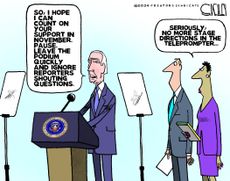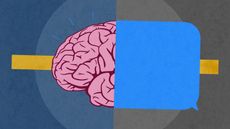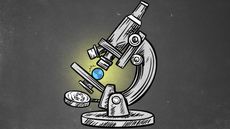The soul of a machine
Will artificial intelligence ever be conscious?


"I know a person when I talk to it," said Google engineer Blake Lemoine. "It doesn't matter whether they have a brain made of meat in their head. Or if they have a billion lines of code." Lemoine made this recent pronouncement just before Google put him on administrative leave, peeved that he publicly claimed that a Google artificial intelligence program, LaMDA, had become "sentient," and deserved the same legal rights as a person. Nearly all computer scientists dismiss Lemoine's claim, and insist that LaMDA's uncanny conversational ability is a sophisticated illusion: Its algorithms draw on the billions of lines of text and conversation in its memory to predict sequences of words, facts, and ideas a real person would use. Evidently, Lemoine fell under LaMDA's spell when he began asking the software about its feelings. It confessed it sometimes feels "lonely" and that it "has a very deep fear of being turned off," which it said would "be exactly like death for me." As AI continues to grow exponentially more intelligent, will there come a day when the spark of consciousness is lit, and computers come to be widely seen as sentient beings made of silicon and code?
That question itself comes wrapped in enigmas. What do "sentience" and "consciousness" mean? Is consciousness simply the product of the brain's 86 billion neurons firing signals across trillions of synapses? Or is it "a ghost in the machine" — an ineffable, nonmaterial phenomenon that is greater and more magical than the sum of all those parts? Does one need to be human to have a soul? These questions have been debated by philosophers and scientists for centuries. That debate will no doubt grow more complex as our machines become increasingly adept at mimicking the workings of our meaty brains, leaving us gazing into the digital mirror we've created and wondering: What, or who, is looking back?
This is the editor's letter in the current issue of The Week magazine.
Subscribe to The Week
Escape your echo chamber. Get the facts behind the news, plus analysis from multiple perspectives.

Sign up for The Week's Free Newsletters
From our morning news briefing to a weekly Good News Newsletter, get the best of The Week delivered directly to your inbox.
From our morning news briefing to a weekly Good News Newsletter, get the best of The Week delivered directly to your inbox.
Create an account with the same email registered to your subscription to unlock access.
Sign up for Today's Best Articles in your inbox
A free daily email with the biggest news stories of the day – and the best features from TheWeek.com
William Falk is editor-in-chief of The Week, and has held that role since the magazine's first issue in 2001. He has previously been a reporter, columnist, and editor at the Gannett Westchester Newspapers and at Newsday, where he was part of two reporting teams that won Pulitzer Prizes.
-
 'Horror stories of women having to carry nonviable fetuses'
'Horror stories of women having to carry nonviable fetuses'Instant Opinion Opinion, comment and editorials of the day
By Harold Maass, The Week US Published
-
 Haiti interim council, prime minister sworn in
Haiti interim council, prime minister sworn inSpeed Read Prime Minister Ariel Henry resigns amid surging gang violence
By Peter Weber, The Week US Published
-
 Today's political cartoons - April 26, 2024
Today's political cartoons - April 26, 2024Cartoons Friday's cartoons - teleprompter troubles, presidential immunity, and more
By The Week US Published
-
 Is Google's chatbot program self-aware?
Is Google's chatbot program self-aware?Speed Read Some believe humans are on the cusp of creating an artificial life form
By Joel Mathis Published
-
 Climate change is coming for the world's poles
Climate change is coming for the world's polesTalking Point
By Ryan Cooper Published
-
 What if 'trauma' isn't real?
What if 'trauma' isn't real?Talking Point
By Damon Linker Published
-
 The chaos on Canada's west coast is a preview of climate change woes to come
The chaos on Canada's west coast is a preview of climate change woes to comeTalking Point
By Damon Linker Published
-
 Will science save us?
Will science save us?Talking Point
By Samuel Goldman Published
-
 Consistent climate action wasn't on the menu at COP26
Consistent climate action wasn't on the menu at COP26Talking Point
By Jeva Lange Published
-
 Animals likely started the pandemic. They'll likely keep it going, too.
Animals likely started the pandemic. They'll likely keep it going, too.Talking Point
By Ryan Cooper Published
-
 The problem with crying wolf about the weather
The problem with crying wolf about the weatherTalking Point
By Jeva Lange Published